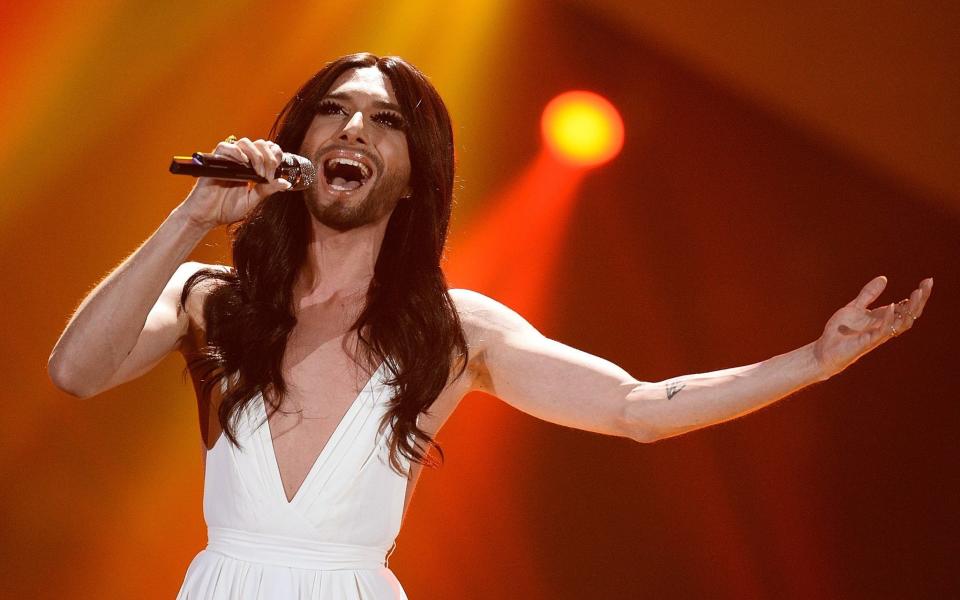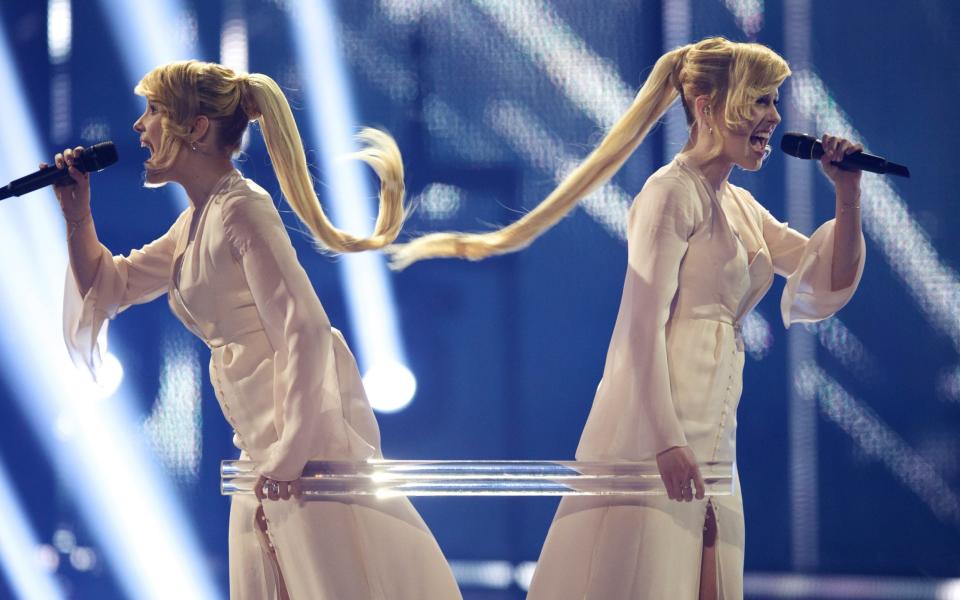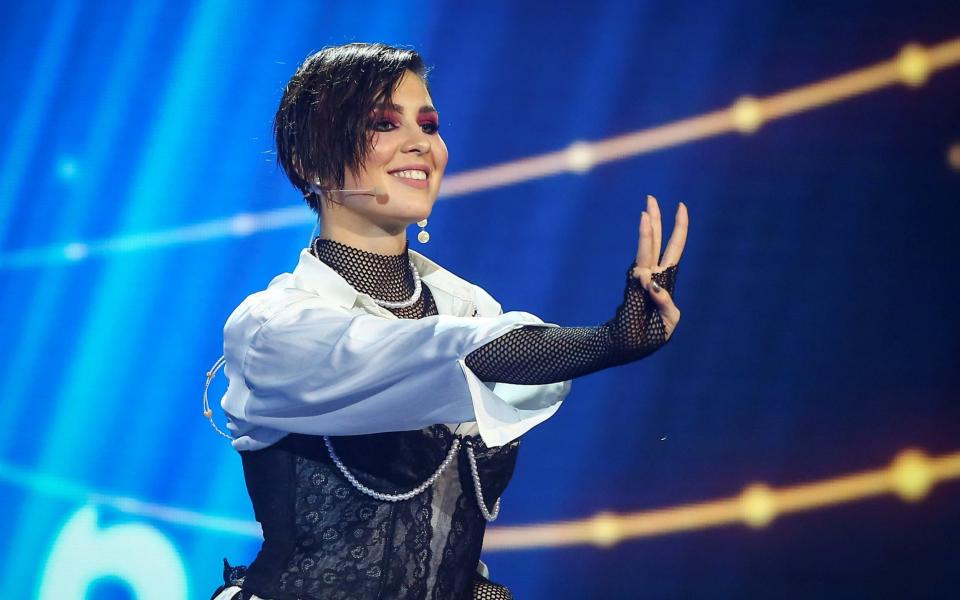Eurovision has long been a battleground between Russia and Ukraine

- Oops!Something went wrong.Please try again later.
In a dramatic reversal, just 24 hours after saying that Russia would still be allowed to compete in the Eurovision Song Contest in Turin in May, organisers announced on Friday evening that the nation is now banned. The decision was made due to the “unprecedented crisis in Ukraine”, the European Broadcasting Union’s executive board said in a statement, which meant that the inclusion of a Russian entry would “bring the competition into disrepute.”
However, the statement went on to emphasise that Eurovision is still dedicated to its goals of international exchange and understanding, and uniting Europe in song on one stage. That’s in line with EBU’s initial rhetoric on Thursday, when they insisted that Eurovision is a “non-political cultural event” and so could host both Russia and Ukraine.
But an overwhelmingly negative response to that spurious attempt at a neutral stance, including from state broadcasters in Ukraine, Iceland, Finland, Norway and the Netherlands, and several acts threatening withdrawal, have clearly put enough pressure on the EBU to force a hasty U-turn.
This is, of course, an extraordinary moment to even think about putting Russia and Ukraine on one stage, hand-waving away all other concerns, and simply hoping that music can solve everything. But, just as with the current political and military conflict, there’s a long and complex history to this particular Eurovision friction – despite organisers’ best efforts to ignore it.
If we go all the way back to 2007, Russia took umbrage with Ukraine’s entrant Verka Serduchka and her song Dancing Lasha Tumbai. Was there simmering anti-Russian subtext in the number via a reference to Kyiv’s square Maidan, where the 2004 Orange Revolution protests took place – subsequently a shorthand for challenging authoritarian rule? And was the seemingly benign phrase “lasha tumbai” meant to sound like “Russia goodbye”?
Serduchka protested innocence: “lasha tumbai” actually meant “churned butter” in Mongolian, she claimed. Later, she admitted it was in fact meaningless, only chosen because she needed a rhyme. But it did mean that Eurovision had become a platform for Russian-Ukrainian discord. And that wouldn’t be the last spat – far from it.
Of course, Russian’s brutal annexation of Crimea in 2014 ratcheted up tensions in this proxy war. Add to that Russia’s new, virulently homophobic “gay propaganda” law, and it was hardly surprising that they were unwelcome at the subsequent Eurovision – an event characterised both by its idealistic vision of international harmony and by its out-and-proud flamboyance.
Russia was still allowed to compete, but the audience, unusually for this upbeat contest, loudly booed their entrant, The Tolmachevy Sisters. Boos also rang out when Russia’s spokesperson cast their votes, and when other countries gave points to Russia. It was perhaps no coincidence that that year’s winner was the defiant Austrian drag queen Conchita Wurst.

Vladimir Putin was so incensed by Wurst’s win that he announced plans to revive the Intervision Song Contest – essentially the Eastern Bloc version of Eurovision, popular in the late 1970s – but it never came to fruition.
In 2015, the audience once again showed their support of Ukraine via more booing of Russia’s entry – this time the singer Polina Gagarina, who was reduced to tears. Eurovision organisers’ typically spineless response was to install anti-booing technology; if you can’t hear it, it’s not happening.
But no technology could prevent the Russian-Ukrainian dispute once again dominating conversation in 2016. Initially, it looked like Russia’s Sergey Lazarev – who shot to fame in the magnificently named band Smash!! – was a sure thing with his upbeat earworm You Are The Only One, and a confident performance backed by busy video graphics. He was bookies’ favourite from early on.
Not so fast. Step forward Ukraine’s Jamala with her angsty ballad 1944. Astonishingly, given the Eurovision organisers’ determination to snuff out politics, Jamala was given the green light, though she made clear in interviews that the song – which is about strangers coming to your house and killing everyone – was specifically about Stalin’s genocidal deportation of Crimean Tatars in 1944. Jamala’s own great-grandmother and her five children were among those deported; one of the children died during the exodus.
But that’s not all. Jamala also drew explicit parallels with Russia’s 2014 annexation of Crimea, telling reporters: “The main message is to remember and to know this story. When we know, we prevent.” Jamala hadn’t been home to Crimea since the annexation, though her family still lived there.

She went further in an interview with Radio Free Europe-Radio Liberty in relating the song to current events, saying that “the Crimean Tatars are on occupied territory and it is very hard for them.” She added: “Some have disappeared without a trace. And that is terrifying. I would not want to see history repeat itself.”
Speaking to the Guardian, she proclaimed that if she were to win, it would mean that “modern European people are not indifferent” to the pain of others. She then said of her song: “Of course it’s about 2014 as well. These two years have added so much sadness to my life. Imagine – you’re a creative person, a singer, but you can’t go home for two years. You see your grandfather on Skype, who is 90 years old and ill, but you can’t visit him. What am I supposed to do: just sing nice songs and forget about it? Of course I can’t do that.”
Ruslana, Ukraine’s 2004 Eurovision winner, praised Jamala for commenting on the Crimea situation through her music. The song, she felt, “is precisely what we are all suffering in Ukraine today.”
Though a controversial choice, Jamala went on to win with a massive total of 534 points, beating Russia into third place. Even more galling for Russia: many former Soviet countries switched their allegiance and voted for Ukraine instead.
This week, Jamala weighed in once again via an Instagram video. “I don’t know how this is possible, but they bombed peaceful people,” she said of Russia’s invasion. “Please support Ukraine. Stop Russian aggression.”
Jamala’s surprise Eurovision win meant that Ukraine was set to host in 2017 – and Russia’s proposed entrant, Julia Samoylova, immediately came under fire. She had performed in Kerch in Crimea, travelling there directly from Russia instead of through official land checkpoints, in contravention of Ukrainian law. Was her selection a deliberate provocation by the Russians? Many thought so, including Ukraine’s President, Petro Poroshenko. Samoylova was subsequently banned from entering the country.
The EBU has issued the statement below regarding Russia's participation in the Eurovision Song Contest 2022
Find it online here➡️https://t.co/5xXIYUNmXO#Eurovision #ESC2022 pic.twitter.com/OGjQKtiZfm— EBU (@EBU_HQ) February 25, 2022
The EBU once again scrambled for neutrality. Its general director Ingrid Deltenre called Ukraine’s decision “absolutely unacceptable”, since it was “political action” which went against the Eurovision ethos, but eventually the EBU said it would respect the host country’s laws. In response, Russia’s Channel One refused to broadcast that year’s contest.
Understandably, then, recent years have seen a particular sensitivity about Ukrainian Eurovision representatives’s attitude to Russia. But in 2019, a furious internal battle meant that this time Ukraine was out of the contest.
It began smoothly enough. The National Television Company of Ukraine (UA:PBC) and commercial broadcaster STB arranged for a grand final of the potential Eurovision entrants at the Palace of Culture in Kyiv. Voting was split between the public and an expert jury, and the clear winner was pop singer Maruv with her seductive Siren Song.
There were a few red flags during the final, however. The jury asked contestants tough questions about Russian-Ukrainian conflict – not exactly your usual fare on a light-entertainment show. Maruv was grilled on Crimea: did she think it was Ukrainian territory? Yes, she answered. Another hopeful, Anna Maria, was asked to choose between Ukraine and her mother, who worked for the Russian-controlled Crimean government.

However, the problems deepened when the UA:PBC immediately presented Maruv with a contract which prevented her from making any appearances or performing in Russia in the lead-up to Eurovision. Not only that, she was banned from improvising on stage or speaking to journalists without explicit permission – or she would face a fine of around £56,000.
Vyacheslav Kyrylenko, Vice Prime Minister and Minister of Culture, weighed in with an ominous public statement, saying that artists who performed in Russia or “did not recognise the territorial integrity of Ukraine” should not represent Ukraine in Eurovision.
Maruv, who had indeed been planning to play two Russian concerts before Eurovision, refused to sign. Instead, she made a furious statement of her own. “I am a musician, rather than a tool of the political stage,” she protested.
UA:PBC offered the honour of a Eurovision spot to the runner-up, Freedom Jazz, and then, when they refused it, to third-placed dance act Kazka. No dice. “We do not need a win at any price,” said Kazka on their Instagram. “Our mission is to unite people with music, not to sow discord.”
The UA:PBC had no choice but to withdraw from Eurovision altogether, putting the blame, in their statement, on “a systemic problem in Ukraine’s music industry: the connection of artists to the territory of the aggressor state.” In some parts of their society, they professed, that tie to Russia “causes indignation and rejection”.
The controversy rumbles on. Ukraine’s original 2022 Eurovision contestant, Alina Pash, stepped down after it was discovered that she’d visited Crimea in 2015 – after Russia’s annexation. Instead, runner-up Kalush Orchestra – who mix rap with traditional folk music – will compete in Turin with their song Stefania, an ode to mothers.
Kalush Orchestra’s Oleh Psyuk recognised the significance of this moment, saying: “In difficult times for our country, we must reaffirm ourselves to the world. That is why we are ready to present Ukraine with dignity to the whole of Europe.”
Though we now know that Russia will be absent at this year’s Eurovision, that doesn’t mean this proxy war won’t continue to play out. As much as organisers might wish otherwise, many artists feel a responsibility to express their views on this huge stage – and right now, the world is listening.

